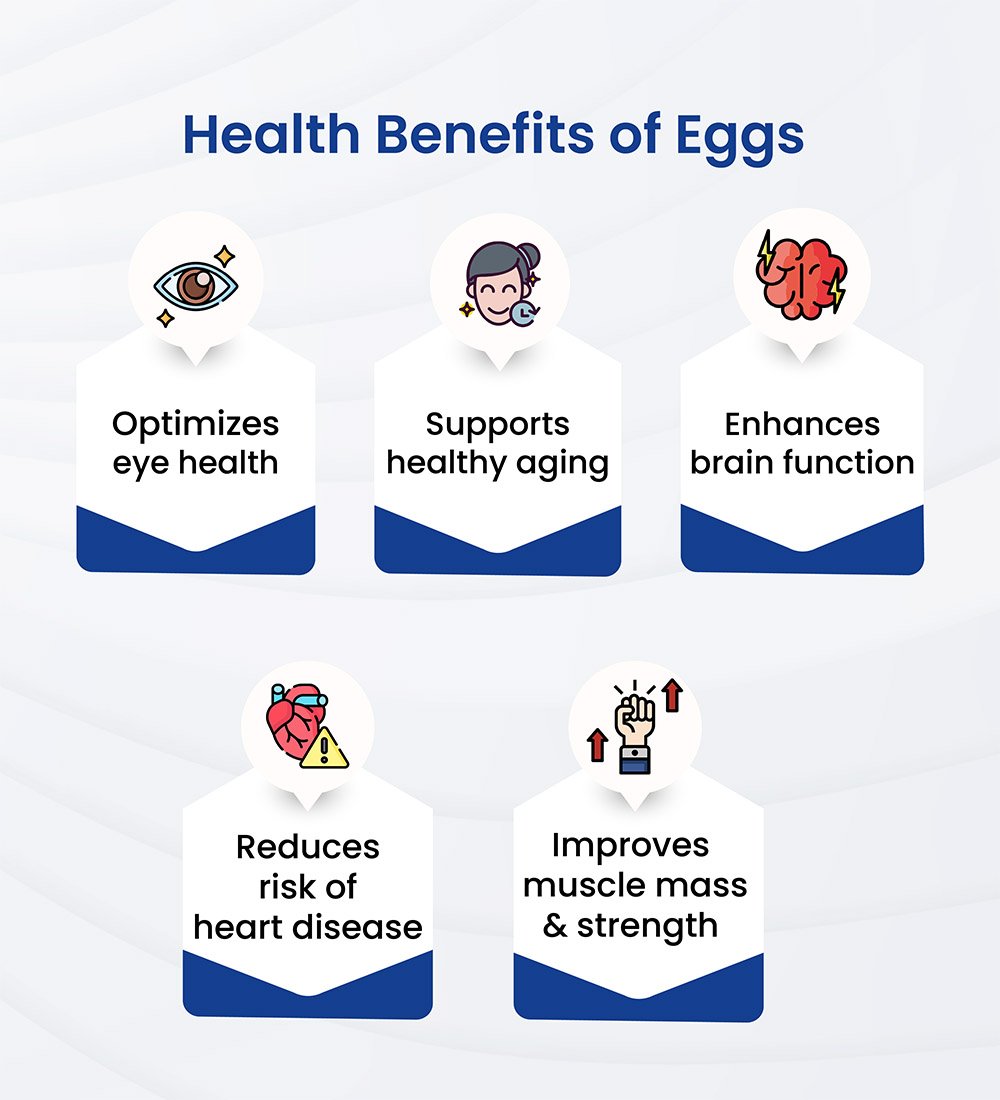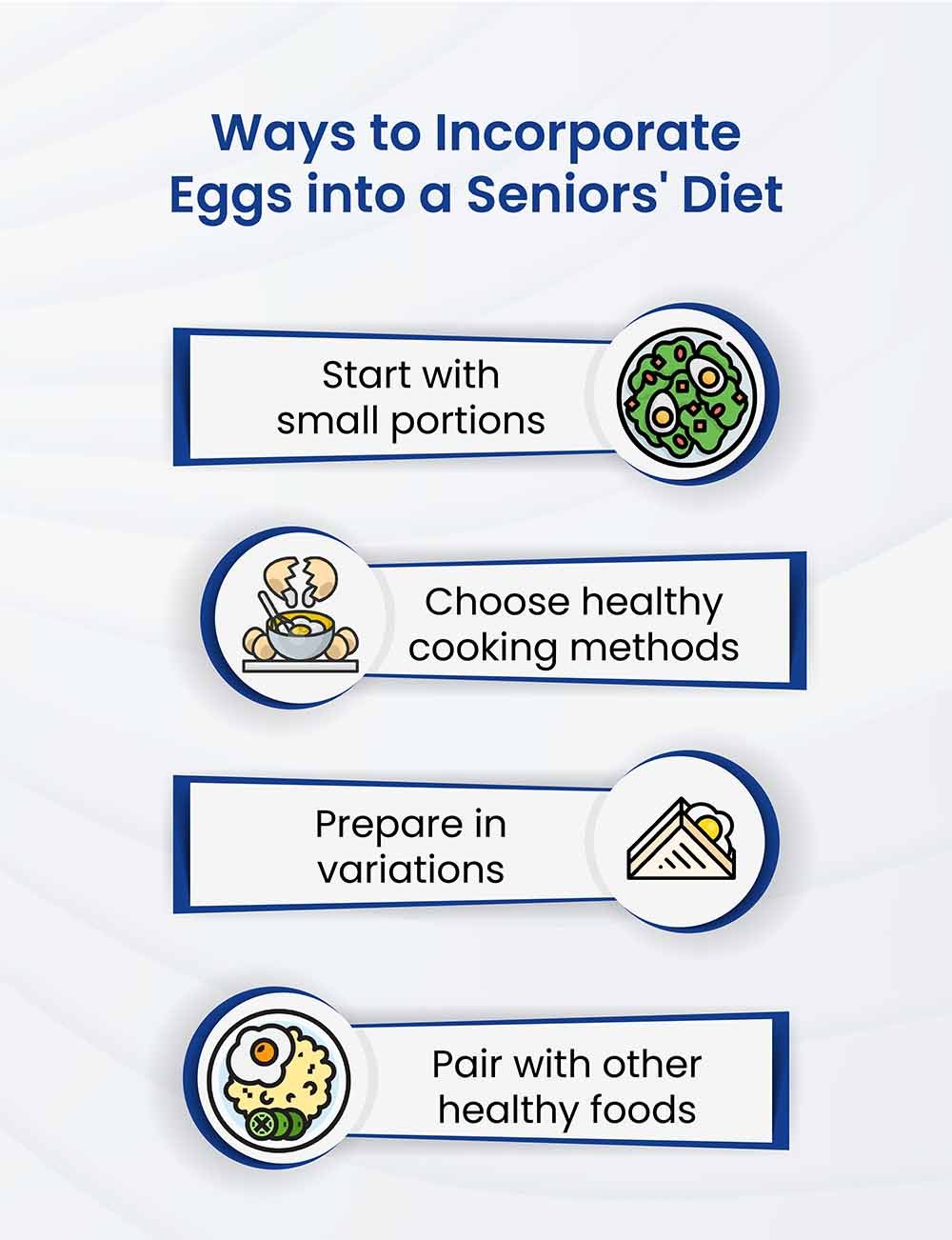Good nutrition is important for all. Eating a healthy and balanced diet helps the body function well. With age, the body undergoes changes that can affect nutritional needs. Older people may require fewer calories, but their bodies still need essential nutrients to maintain good health. Proper nutrition can help prevent and manage chronic diseases, support immune function, and improve the overall quality of life.
Eggs are a nutritious and versatile food that can provide numerous health benefits. They are a great option for seniors who have difficulty cooking complex meals. Eggs are a good source of high-quality protein, essential vitamins and minerals, and healthy fats. Incorporating eggs into seniors’ diets can improve their health and protect against age-related diseases. Some of the benefits of eggs include supporting muscle health, promoting healthy brain function, reducing inflammation, and helping to manage weight. Seniors should consider including eggs in their diet in moderation as part of a healthy and balanced meal plan.
Table of Contents
Nutritional Value of Eggs
High-quality protein
Eggs are an excellent source of high-quality protein, containing all nine essential amino acids, which are building blocks of protein the body can’t produce alone. This makes them a great food choice for older people who may be at risk of muscle loss and need to maintain muscle mass and physical strength.
Essential vitamins and minerals
Eggs provide a variety of essential nutrients and minerals, including vitamin B12, vitamin D, vitamin A, choline, selenium, and iron. Vitamin B12 helps with nerve function and prevents anemia. Vitamin D is good for maintaining strong bones and muscles and is particularly important for seniors at risk of osteoporosis. Additionally, choline and selenium are antioxidant minerals that help protect against cell damage and boost the immune system.
Good fat content
Eggs are often considered a controversial food due to their cholesterol content. However, contrary to popular belief, eggs contain healthy fats that benefit seniors’ health. Eggs are a good source of monounsaturated and polyunsaturated fats, which help to reduce the risk of heart disease and stroke. These healthy fats can also aid in absorbing essential fat-soluble vitamins, such as vitamins A and D. Additionally, eggs can keep seniors feeling full after meals and help manage weight.
Health Benefits of Eggs
Some of the key health benefits of eggs for seniors include:

Optimizes eye health
Eggs contain lutein and zeaxanthin, antioxidants that can help protect against age-related macular degeneration, a leading cause of vision loss in seniors. Eating eggs can also help improve overall eye health.
Supports healthy aging
The variety of nutrients and antioxidants in eggs help protect against age-related diseases. Lutein and zeaxanthin can also protect against chronic diseases. Egg consumption is also associated with a reduced risk of dementia. It is an excellent food choice to support healthy aging.
Seniors suffering from chronic conditions can connect with the primary care physicians at EliteCare Health Centers to manage their chronic diseases, including prescribing medications, recommending lifestyle changes, and monitoring symptoms.
Enhances brain function
Choline is also great for brain health. Some studies suggested that consuming choline-rich foods moderates the cognitive and memory decline rate in older adults.
Reduces risk of cardiovascular diseases
Eating eggs can help reduce the risk of cardiovascular diseases, such as heart disease and stroke. The healthy fats in eggs improve cholesterol levels, and the presence of choline can help reduce inflammation, which is a risk factor for heart disease.
Improves muscle mass and strength
The high-quality protein present in the egg can assist in preserving and developing muscle mass and strength, which is crucial for seniors as they suffer from muscle loss due to age. This can ultimately enhance their physical function, balance, and mobility.
Incorporating Eggs into Your Diet

Incorporating eggs into your diet can be a simple and effective way to add important nutrients and health benefits to meals. Here are some tips:
Start with small portions: Due to decrease metabolism and certain health conditions, seniors may have a smaller appetite, so start by serving smaller portions of eggs.
Choose healthy cooking methods: How eggs are cooked can affect their nutritional value and overall health benefits. Avoid frying eggs in butter or oil, which can add extra fat and calories. Instead, try poaching, boiling, or baking eggs.
Mix it up: Eggs can be prepared in a variety of ways, so mix them up to keep things interesting. Try scrambled eggs, omelets, frittatas, or hard-boiled eggs with a sprinkling of herbs and seasoning.
Pair with other healthy foods: Eggs can be paired with other healthy foods, such as vegetables, whole grains, and fruit, to create a balanced and nutritious meal.
Seniors are more susceptible to foodborne illness, so handle and prepare eggs safely. This includes washing hands and utensils, cooking eggs to a safe temperature, and refrigerating leftover eggs promptly.
Sample Meal Plan Ideas
Here are some sample meal plan ideas for seniors that incorporate eggs:
Breakfast:
- Scrambled eggs with whole wheat toast and a side of fresh fruit
- Greek yogurt with berries and a hard-boiled egg
- Veggie omelet with whole wheat English muffin
Lunch:
- Egg salad sandwich on whole grain bread with a side salad
- Spinach and feta frittata with whole grain crackers and hummus
- Tuna and egg salad with whole-grain pita bread
Dinner:
- Grilled salmon with a side of roasted vegetables and a boiled egg
- Quinoa and vegetable stir-fry with a fried egg on top
- Sweet potato and black bean hash with a poached egg on top
Snacks:
- Hard-boiled eggs with sliced veggies
- Deviled eggs with whole-grain crackers
- Cottage cheese with a boiled egg and fresh fruit
Bottom Line
Considering a senior’s dietary restrictions before incorporating eggs into their diet is important. For example, seniors with high cholesterol levels may need to limit their egg intake. Additionally, seniors with food allergies or intolerances may need to avoid eggs altogether. However, eggs’ nutritional benefits and versatility make them easy to add to the diet when consumed in moderation and prepared in a healthy manner. Speaking with the healthcare provider or registered dietitian at our medical clinic is important to determine how eggs can fit into seniors’ diets.










